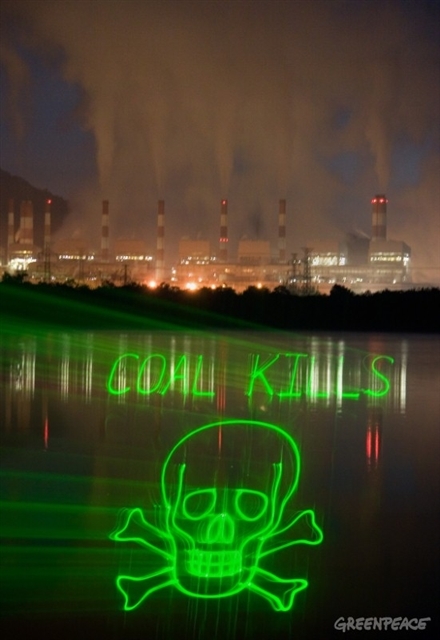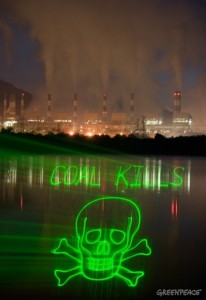
MANILA (Mindanao Examiner / June 5, 2013) – Climate activists trooped to the Department of Energy and Natural Resources and demanded the Aquino government to stop supporting dirty coal-fired power plants in the country.
Led by Philippine Movement for Climate Justice, the group demanded DENR to stop issuing environmental compliance certificate for a project that is detrimental to the environment and communities.
They voiced out their concerns on the alarming scientific revelations, and how the global community and our country must act in the face of climate catastrophes.
The Figures Don’t Lie
Presently there are nine operational coal–fired power plant a total of 4,278 MW, plus there are an additional 16 approved coal-fired power plant projects already in the pipeline producing a total of 4,552 MW.
At the same time, there are already 60 coal mining permits given by the national government. These are environmentally-critical projects – led by Consunjis, Aboitizes, Lopezes that benefit from high electricity rates – given the permit to destroy mountains and other ecosystems, affects peoples’ lives, displaces communities and increase the countries GHG contribution.
Gerry Arances, National Coordinator of Philippine Movement for Climate Justice, said the recent announcement of Isidro Consunji that they plan to put up coal-fired power plants in almost all off grid areas in the country clearly demonstrates DMCI’s complete disregard of people’s welfare and environment protection over and above realizing their profit.
He said this is on top of the plan of the Aboitiz to beef up their power investments to P125 billion which will translate to a 600MW coal-fired power plant in Subic, and 3 coal-fired power plant of 400MW expansion in Pagbilao, 300MW Therma South coal plant in Mindanao and an additional coal plant in Cebu, and several more proposed coal plants across the country.
“Clearly an expression of extreme corporate greed masquerading as bearer of progress and development,” he said.
Kathryn Leuch, coordinator of Palawan Alliance for Clean energy, said most glaring of these environmentally-destructive projects about to seek approval from the DENR is the 15MW coal-fired power plant which is proposed to be built in biodiversity-rich Narra, Palawan.
“We at PACE contend that there is no immediate need for an additional energy source in the province. Also, there are three sites for tapping hydro-power which can provide about 80GWh of energy, about half of the annual demand of the consumers,” she said.
She said to allow the project’s fruition is to inflict direct assault on the environment since Palawan has a unique biodiversity and a sensitive environment.
“Such a project will only benefit the DMCI scions, the Consujis, who also have a stake at the Berong Nickel Corp. We need assurance from the DENR, the government’s arm in supposedly caring for our country’s natural resources that they will not allow the building of this facility which will serve as a major threat to the preservation of nature,” Leuch said.
In Mindanao, the Alcantaras’ Conal Holdings Corporation is planning to produce energy allegedly for another controversial project, the Tampakan Copper and Gold Mining Project in South Cotabato. It was found that the development of the coal plant is aimed at providing needed electricity for Sagittarius Mines Inc. operations.
There is another coal-fired power plant being built in Zamboanga City despite strong opposition from residents.
Jaybee Garganera, national coordinator of Alyansa Tigil Mina and council member of PMCJ said: “This is a clear example of corporate capture of the country’s natural resources, for their own benefits. Natural resources that are defense against floods, landslides and erosions. The sad fact is that people bear the brunt of disasters. Like in the case of the Padcal spill, Philex hid behind a force majeure provision to buck penalty payments, after almost a century of profiting from mining in Benguet.”
PMCJ also questioned the policies of the Aquino government on protecting the environment and reiterated the need to do something to ensure that our ecosystems are intact and able to mitigate the impacts of climate change to Filipino communities.
Climate activists oppose the direction of the government in further burning fossil fuels for energy and encourage the government to tap renewable energy sources to solve the country’s power problems.
“Although we only contribute a little to the total global GHG emission around 0.31%, it does not mean that we must allow proliferation of coal-fired power plants in the country. Our leaders must have a paradigm shift, instead of banking on these projects for possible source of energy that the country needs. We acknowledge that we must tap energy sources to meet our demand for power but we definitely say that it must not be done in this manner.
“We want to draw the line here, PMCJ calls for a stop in the use of dirty and harmful energy, like coal and other fossil fuels, renewable energy must be harnessed in a faster way to avert harm caused by these energy sources. At the same time these renewable energy alternatives must be democratic and accessible to each and every Juan dela Cruz because first and foremost and that they are truly the ones entitled to all the developments that this nation reaps.” Arances stressed.
PMCJ also asserts that these coal projects will further destroy the environment and further weaken the adaptive capability of communities and vulnerable areas in confronting the negative effects of climate change. It will only farther aggravate and multiply effects of disasters to the Filipino people.
“We must not let corporations decide for our nation’s fate, we must combat corporate greed in all front and in all forms before this nation is thrown out to the dogs,” Arances said.
Recent scientific findings released from Maura Loa Observatory in Hawaii measured the carbon dioxide concentration in the Earth atmosphere at an alarming figure of 400 parts per million. The international coal industry was identified as the main contributor of more than 60% of the total global GHG emissions.

